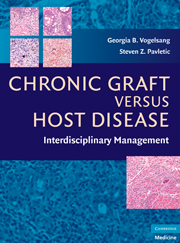Book contents
- Frontmatter
- Contents
- List of Contributors
- Preface
- PART I GENERAL PRINCIPLES
- PART II CLINICAL MANAGEMENT
- PART III ORGAN SITE OR SYSTEM-SPECIFIC MANIFESTATIONS
- PART IV SPECIAL CONSIDERATIONS IN CHRONIC GVHD
- 31 Design of Clinical Trials Testing Treatment for Chronic Graft versus Host Disease
- 32 Spectrum of Chronic Graft versus Host Disease in Unique Clinical Situations: The Role of Stem-Cell Source Including Cord Blood Stem Cells, Reduced-Intensity Conditioning, and Donor Leukocyte Infusions
- 33 Pediatric Chronic Graft versus Host Disease
- 34 Principles of Interdisciplinary Practice in the Care of Patients with Chronic Graft versus Host Disease
- 35 Patient Advocacy, Education and Psychosocial Support
- 36 Future Directions
- Index
- Plate section
34 - Principles of Interdisciplinary Practice in the Care of Patients with Chronic Graft versus Host Disease
from PART IV - SPECIAL CONSIDERATIONS IN CHRONIC GVHD
Published online by Cambridge University Press: 26 August 2009
- Frontmatter
- Contents
- List of Contributors
- Preface
- PART I GENERAL PRINCIPLES
- PART II CLINICAL MANAGEMENT
- PART III ORGAN SITE OR SYSTEM-SPECIFIC MANIFESTATIONS
- PART IV SPECIAL CONSIDERATIONS IN CHRONIC GVHD
- 31 Design of Clinical Trials Testing Treatment for Chronic Graft versus Host Disease
- 32 Spectrum of Chronic Graft versus Host Disease in Unique Clinical Situations: The Role of Stem-Cell Source Including Cord Blood Stem Cells, Reduced-Intensity Conditioning, and Donor Leukocyte Infusions
- 33 Pediatric Chronic Graft versus Host Disease
- 34 Principles of Interdisciplinary Practice in the Care of Patients with Chronic Graft versus Host Disease
- 35 Patient Advocacy, Education and Psychosocial Support
- 36 Future Directions
- Index
- Plate section
Summary
INTRODUCTION
Patients with chronic graft versus host disease (cGVHD) experience a variety of health needs that result directly from the physical, functional, and psychosocial effects of the disease, are produced as side effects of immunosuppressive treatments, or derive from the late treatment effects of high-dose therapy and hematopoietic stem cell transplantation (HSCT). The achieving optimal outcomes for patients with cGVHD requires the coordinated efforts of an interdisciplinary team delivering a comprehensive range of clinical services in both community-based and specialty care settings. The services must be designed to promptly detect, effectively mitigate, and, where possible, prevent these sequelae. This chapter focuses on the principles of interdisciplinary practice in the care of patients with cGVHD. The chapter examines seven fundamental elements for successful interdisciplinary practice in cGVHD. These elements address (1) the composition, functioning, leadership, and coordination of the team, (2) the organizational service delivery model, (3) communication and collaboration, (4) eliminating barriers to access to needed services, (5) the development of standards of care, standard operating procedures, and evidence-based guidelines, (6) involvement of patient and family, and (7) coordination and continuity of care between specialty care centers and community. Case vignettes illustrate the application of the principles of interdisciplinary care and analyze the features of interdisciplinary team functioning that contribute to optimal clinical outcomes in HSCT survivors with cGVHD and the family members and communities who are caring for them.
- Type
- Chapter
- Information
- Chronic Graft Versus Host DiseaseInterdisciplinary Management, pp. 386 - 395Publisher: Cambridge University PressPrint publication year: 2009
- 2
- Cited by



